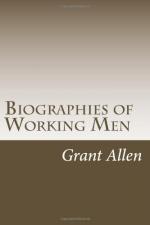Near the end of his third year at Chester, James met, quite accidentally, with a young man who had come from a little embryo “college,” of the sort so common in rising American towns, at a place called Hiram in Ohio. American schools are almost as remarkable as American towns for the oddity and ugliness of their names; and this “college” was known by the queer and meaningless title of the “Eclectic Institute.” It was conducted by an obscure sect who dub themselves “The Disciples’ Church,” to which young Garfield’s father and mother had both belonged. His casual acquaintance urged upon him strongly the desirability of attending the institute; and James, who had already begun to learn Latin, and wished to learn more, was easily persuaded to try this particular school rather than any other.
In August, 1851, James Garfield, then aged nearly twenty, presented himself at the “Eclectic Institute,” in the farm-labourer’s clothes which were his only existing raiment. He asked to see the “president” of the school, and told him plainly that he wished to come there for education, but that he was poor, and if he came, he must work for his living. “What can you do?” asked the president. “Sweep the floors, light the fires, ring the bell, and make myself generally useful,” answered the young backwoodsman. The president, pleased with his eagerness, promised to try him for a fortnight; and at the end of the fortnight, Garfield had earned his teaching so well that he was excused from all further fees during the remainder of his stay at the little institute. His post was by no mean an easy one, for he was servant-of-all-work as well as student; but he cared very little for that as long as he could gain the means for self-improvement.
Hiram was a small town, as ugly as its name. Twelve miles from a railway, a mere agricultural centre, of the rough back-country sort, all brand new and dreary looking, with a couple of wooden churches, half a dozen wooden shops, two new intersecting streets with wooden sidewalks, and that was all. The “institute” was a square brick block, planted incongruously in the middle of an Indian-corn plantation; and the students were the sons and daughters of the surrounding farmers, for (as in most western schools) both sexes were here educated together. But the place suited Garfield far better than an older and more dignified university would have done. The other students knew no more than he did, so that he did not feel himself at a disadvantage; they were dressed almost as plainly as himself; and during the time he was at Hiram he worked away with a will at Latin, Greek, and the higher mathematics, so as to qualify himself for a better place hereafter. Meanwhile, the local carpenter gave him plenty of planing to do, with which he managed to pay his way; and as he had to rise before five every morning to ring the first bell, he was under no danger of oversleeping himself. By 1853, he had made so much progress in his studies that he was admitted as a sort of pupil teacher, giving instruction himself in the English department and in rudimentary Greek and Latin, while he went on with his own studies with the aid of the other teachers.




